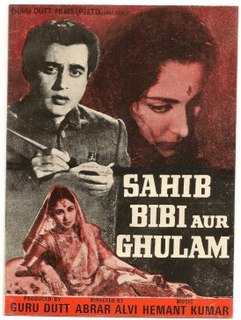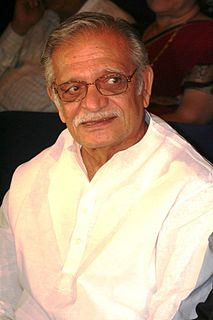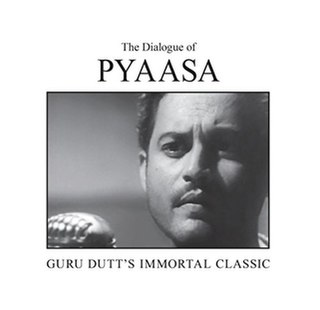
Javed Akhtar is an Indian poet, lyricist, screenwriter and political activist. Known for his work in Hindi cinema, he has won five National Film Awards, and received the Padma Shri in 1999 and the Padma Bhushan in 2007, two of India's highest civilian honours.

Dil Se.. is a 1998 Indian Hindi-language romantic thriller film written and directed by Mani Ratnam, and produced by Ratnam, Ram Gopal Varma, and Shekhar Kapur. Set in the backdrop of Insurgency in Assam, the film stars Shahrukh Khan and Manisha Koirala, while Preity Zinta makes her film debut in a supporting role. Written by Ratnam and Tigmanshu Dhulia, the film is an example of parallel cinema and is noted as the final installment of Ratnam's thematic trilogy that consists of Roja (1992) and Bombay (1995).

Waheeda Rehman is an Indian actress and dancer. Regarded as one of Hindi cinema's greatest actresses, Rehman's accolades include a National Film Award and three Filmfare Awards. Rehman was honoured Government of India with the Padma Shri in 1972, later receiving the Padma Bhushan in 2011. She has received significant media coverage across her film career.

Malaika Arora is an Indian actress, dancer, model, VJ, and television personality who appears in Hindi-language films. She made her debut as a film producer in 2008, with former husband Arbaaz Khan, founding the company Arbaaz Khan Productions, which has created the Dabangg film series. As an actress, Arora has starred in main roles in films Kaante (2002) and EMI (2008). As a dancer, she is acclaimed for her performances in the songs Chaiyya Chaiyya (1998), Gur Naalo Ishq Mitha (1998), Maahi Ve (2002), Kaal Dhamaal (2005), and Munni Badnaam Hui (2010).
Nasreen Munni Kabir is an India-born television producer, director and author based in the U.K. She is best known for producing an annual season of Indian films for the British terrestrial television channel Channel 4.
"Chaiyya Chaiyya" is an Indian pop-folk song, featured in the soundtrack of the Bollywood film Dil Se.., released in 1998. Based on Sufi music and Urdu poetry, the single was composed by A.R. Rahman, written by Gulzar, and sung by Sukhwinder Singh and Sapna Awasthi. The accompanying music video was directed by Mani Ratnam and picturised on Shah Rukh Khan and Malaika Arora, where they perform the song on top of a moving train.

Sukhwinder Singh is an internationally acclaimed Indian playback singer who primarily sings Bollywood songs. He is famous internationally for singing "Jai Ho" from the film Slumdog Millionaire which won an Academy Award for Best Original Song and a Grammy Award for Best Song Written for a Motion Picture, Television or Other Visual Media.

Sahib Bibi Aur Ghulam is a 1962 Indian Hindi-language drama film that was directed by Abrar Alvi and produced by Guru Dutt, who also co-stars in it alongside Meena Kumari, Rehman, and Waheeda Rehman. The film, which is based on Bimal Mitra's Bengali-language novel Saheb Bibi Golam (1953), is set in the 19th century during the British Raj and focuses on Bhoothnath (Dutt), who meets Chhoti (Kumari), the lonely wife of a zamindar (Rehman). The film follows Chhoti's effort to keep her husband—who likes drinking and watching prostitutes perform—at their home by drinking with him. She becomes addicted to alcohol, leading both of them into bankruptcy.
The filmi-ghazal is a genre of filmi music based on ghazal poetry in Hindustani (Hindi-Urdu), used in Indian films, especially the music of Bollywood. The filmi-ghazals retain the couplet format and rhyme scheme similar to that in ghazals. However, instead of vocal or instrumental passages as interludes, the filmi-ghazal usually uses precomposed musical pieces.

Andaz (transl. Style) is a 1971 Indian Bollywood romantic drama film, directed by Ramesh Sippy, and written by Salim–Javed, Gulzar and Sachin Bhowmick. It stars Shammi Kapoor, Hema Malini, Rajesh Khanna, and Simi Garewal.

Aurat, also known by its English title Woman, is a 1940 Indian film directed by Mehboob Khan and starring Sardar Akhtar, Surendra, Yakub, Kanhaiyalal and Arun Kumar Ahuja. The film's music is by Anil Biswas and dialogue is by Wajahat Mirza. Mehboob Khan later remade this film as Mother India (1957), which is considered one of the biggest hits of all time in Indian Cinema.

Sampooran Singh Kalra, known professionally as Gulzar or Gulzar Saab, is an Indian lyricist, poet, author, screenwriter, and film director. He started his career with music director S.D. Burman as a lyricist in the 1963 film Bandini and worked with many music directors including R. D. Burman, Salil Chowdhury, Vishal Bhardwaj and A. R. Rahman. He was awarded Padma Bhushan in 2004, the third-highest civilian award in India, the Sahitya Academy Award, and the Dadasaheb Phalke Award — the highest award in Indian cinema. He has won 5 Indian National Film Awards, 22 Filmfare Awards, one Academy Award and one Grammy Award.
Inder Raj Anand was an Indian film dialogue and screenwriter in Hindi cinema, who worked on many Raj Kapoor films, starting with Aag (1948), Aah (1953), Anari (1959) and Sangam (1963). While formally referred to as a writer for Hindi films, he was actually an Urdu writer, writing his scripts and dialogues in Urdu.

Pandit Narendra Sharma was an Indian writer, poet and lyricist in Hindi language. He also wrote some songs for Indian Hindi cinema, like the title song for Satyam Shivam Sundaram (1979), for which he also received a Filmfare Award nomination for Best Lyricist.

Conversations with Waheeda Rehman is a biography by the producer of television documentaries and author Nasreen Munni Kabir, documenting Kabir's extensive conversations with the actress Waheeda Rehman about the actress' life and career. The biography details Rehman's birth in 1938 in Chingleput, her 54-year-long film career, and her 1974 marriage to the actor Kamaljeet, with whom she has two children. It was published on 19 February 2014 by Penguin Books. The book generated positive reviews from book critics; most of the praise was directed towards the book's question-and-answer format, and Kabir's and Rehman's style in questioning and answering, respectively.

In the Company of a Poet is a 2012 book by the author and television documentary producer Nasreen Munni Kabir, containing her interview with Gulzar. It details his early life, including his birth in 1934 in Dina, British India, and his Sikh family background, his film and poetic career, and his marriage to the actress Rakhee in 1973, with whom he has a daughter, Meghna. In the Company of a Poet was published by Rupa Publications on 12 November 2012 and received mixed reviews from critics. Firstpost included the book in its listing of Top 10 in Indian Non-fiction Books.

Lata Mangeshkar ...in Her Own Voice is a biography by the British author and television documentary producer Nasreen Munni Kabir, detailing the life and career of the Indian playback singer Lata Mangeshkar. The book contains their extensive conversations from May 2008 to March 2009. Published by Niyogi Books on. 15 May 2009, it was well received by literary critics.

The Dialogue of Pyaasa is a 2011 book by the British author and television documentary producer Nasreen Munni Kabir, containing the dialogues of the 1957 Indian romantic drama Pyaasa in Hindustani and its translation in English. The book was published by Om Books International on 28 February 2011 and received positive critical reviews.

A. R. Rahman: The Spirit of Music is a biographical book by the author and television documentary producer Nasreen Munni Kabir, containing her extensive conversations with the composer A. R. Rahman on the latter's life and career. It describes his birth in Madras in 1967, his 29-year-long musical career, and his marriage in 1995 to Saira Banu, with whom he has three children. The book was published by Om Books International on 29 March 2011 and declared as a commercial success.
















